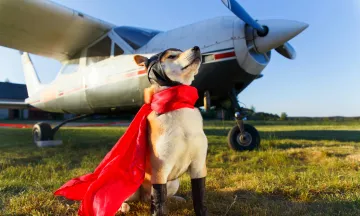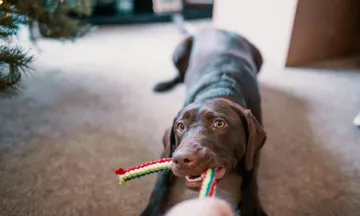What does 'environmental paw-print' mean?
The environmental impact of owning a pet is often referred to as an environmental paw-print, much like the term 'environmental footprint'.
Pet ownership and sustainability aren’t always 100% compatible - yep, even your beloved pet has a substantial carbon output over their lifespan. Actions such as purchasing pet food and managing your pet's waste will have long-term consequences on our eco-system.
If all pet owners make sustainable consumer choices, we can minimise our pet's environmental paw-print... one step at a time!

1. Buy in bulk
Pet owners require a constant supply of food, cat litter, bedding, hay or straw. Buying in bulk saves on packaging materials and transport. As it tends to be cheaper in bulk, it also saves you a considerable amount of money. And it lasts longer too, reducing your shopping trips and petrol consumption.
2. Choose an eco-friendly cat litter
Each cat goes through an average of 45 kg of cat litter per year. The less litter you use, the better it is for the environment. Scooping out clumps on a daily basis enables you to go longer between refills.
We recommend choosing a biodegradable cat litter that’s made from renewable raw materials, such as wood, corn, beet pulp, nuts, paper or compost.
And lastly, use mild, eco-friendly cleaning products when cleaning your litter tray (or rabbit/guinea pig hutch or birdcage): it’s better for the environment and the health of your pet!
3. Adopt a rescue pet
It’s tempting to want a specific breed of cat or dog, and this might be a better arrangement under some circumstances. Yet, opting for a rescue pet is a more sustainable option. You can do this via a reputable animal shelter or a rescue foundation, so to avoid pet scams online.
It’s no secret that there are countless cats and dogs patiently awaiting their forever homes. But did you know that you can also adopt rabbits, rodents and other small pets? Contact your local shelter to find out more.
4. Choose a sustainable pet food
Food places a heavy burden on the environment. You can make a huge difference by selecting sustainable, healthy pet food products.
Be critical of marketing texts that include words such as 'natural', which may sound appealing, but can be misleading. Additionally, make sure that what you buy is truly 'organic' and includes the required certification.
5. Environmentally-conscious dog walking
It's important to always pick up after your dog if they go to the toilet on a walk. This is because dog poo contains bacteria and other harmful nutrients. If discarded on the ground, the bacteria from dog poo spread into the soil and waterways. This can have very serious consequences for the health of our lakes and oceans, as well as the safety of soil to humans in parks.
Rather than using plastic bags, choose a biodegradable product.

6. Protect nature
Pets might be adorable, but many are natural predators. Therefore, while it’s important to satisfy their hunting instincts, never allow your cat or dog to hunt wild animals or birds.
As such, always make sure that your dog is leashed in bushland and parks where they’re not permitted to run free. And if you do wish to indulge your four-legged friend in the thrill of the 'chase', then make your walks extra challenging with a variety of search and retrieve games.
In Asia, bird populations and small animals are under constant threat from hunting cats. The best way to prevent your cat from destructive hunting is to keep them inside or in a cat enclosure. And, of course, ensure plenty of indoor play and stimulation!
7. Sustainable pet toys
Pet stores offer some sustainable cat and dog toy brands. Of course, it’s even more environmentally friendly and fun to make your own! Your guinea pig, rabbit or cat is often just as happy with an empty toilet roll or cardboard box to play with/sleep in like a plastic toy, for example.
And you can rustle up the finest eco-friendly cat toys using only recycled scraps of material and a dash of catnip in next to no time.





